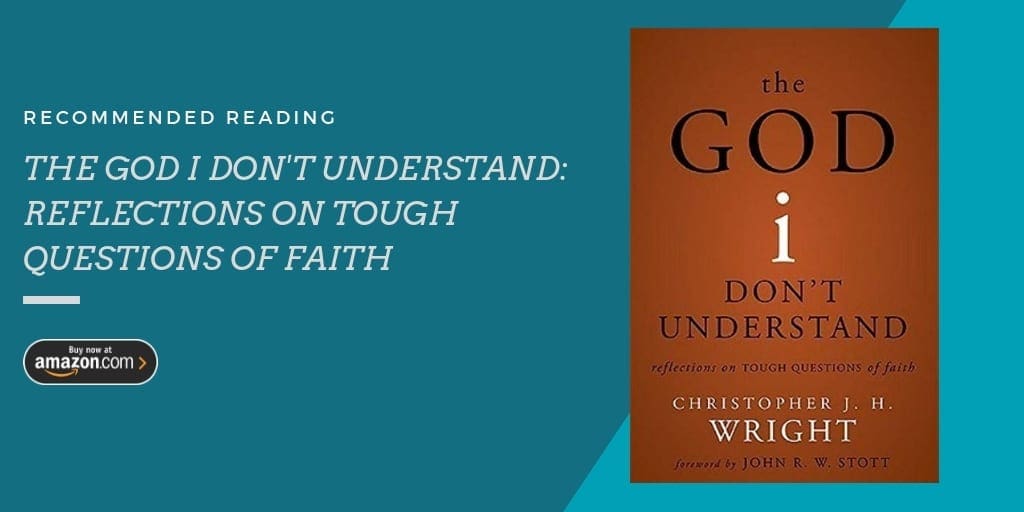
Dan King
author. speaker. bibledude.
what about the canaanites? [the God i don’t understand]

The God of the Old Testament is arguably the most unpleasant character in all fiction: jealous and proud of it; a petty, unjust, unforgiving control-freak; a vindictive, bloodthirsty ethnic cleanser; a misogynistic, homophobic, racist, infanticidal, genocidal, filiacidal, pestilential, megalomaniacal, sadomasochistic, capriciously malevolent bully.
~ Richard Dawkins
This statement has become a battle cry for the new atheist movement. And honestly, when it comes to the conquest of the Canaanites, most Christians are left simply wondering how our good God could order the destruction of every man, woman, and child in much of the land.
Yeah, we throw out statements like, “But He knew what the Israelites would do, and He needed to keep them ‘pure’.” But isn’t that the very definition of ethnic cleansing?
So what’s a Christian to do with the Yahweh of the Old Testament?
Three Dead Ends
Whether or not we can completely answer these questions, we must first address the ways that we (incorrectly) rationalize the issue.
1. It’s an Old Testament Problem, Which the New Testament Puts Right
Sometimes we paint a picture of an Old Testament God as being angry, but the problem with this view is that He actually shows up more like a loving and sacrificial God throughout the Scriptures. Not to mention that the New Testament refers to and accepts the stories of the Old. It would be inconsistent to write it off as a problem that’s later corrected.
2. The Israelites Thought It Was What God Commanded, but They Were Wrong
Aside from the fact that the Scriptures never show God’s correction to what we would call a mistake, it’s referred to as an act that accomplished His will of the Israelites obtaining the land promised to Abraham. If they misinterpreted the direction from God, there would’ve certainly been some sort of judgment for a mistake of that magnitude.
3. It Is All Meant as an Allegory of Spiritual Warfare
This one actually hits at one of my hermeneutical pet peeves… the allegorizing of Scripture. The passages in which these records occur are historical narrative documents. It’s a reporting of the events as they happened. It means what it says.
Three Frameworks
As it relates to Bible interpretation, context is everything. One of the things that I love most about Wright’s book is how he brings context to help us understand.
1. The Framework of the Old Testament Story
One thing that we need to understand is that at any given time, God would need to work through cultural understanding. The kind of warfare that was engaged in was not uncommon for the period during which it occurred. If God told us to do something today that didn’t fit within our understanding of how things happen, then we’d likely dismiss it completely. Like it or not, the act was historically relevant and unique in the Scriptures to that conquest.
2. The Framework of God’s Sovereign Justice
This hits at the idea of ethnic cleansing (genocide). One thing that the Bible is very clear about is that it had nothing to do with racial superiority, but more to do with a judgment for wickedness. It’s also important to point out that this doesn’t mean (nor does Scripture imply) that the Israelites were more righteous than anyone else.
3. The Framework of God’s Plan of Salvation
Finally, the conquests must be kept within the context of the overall message of the Bible… God’s plan for redeeming all nations. God’s heart is against violence that is the result of wickedness, and He longs for the redemption of all of humanity.
While clearing up the misconceptions and establishing good framework may not completely answer all the ‘whys’ we have about the issue of the Canaanites, it certainly opens us up to the idea that we don’t serve a God that’s described the way Dawkins describes Him.






I may be the only person in Christendom who thinks this way, but I think if you want to see God’s mercy, go to the Old Testament.
totally agree with this… God’s mercy and love are are one of the greatest marks throughout the entire OT.
Not the only one. Nope.
“One thing that we need to understand is that at any given time, God would need to work through cultural understanding.”
Interesting. So, God is the author of moral relativism.
hmmm… not sure i agree completely with this observation. i think there is a big difference between cultural understanding and moral relativism. in a modern sense… understanding the current state of affairs between the US and other nations like Iraq or Afghanistan or Libya is not the same thing as understanding the moral value that guide our daily lives.
i hope that’s not the only thing that you took away from this piece, and if you want to explore the topic (and intent) further, then i’m sure that you’d enjoy reading the book.
Interesting take, David. I wouldn’t think our omnipotent God needs to do anything, but He may choose to do whatever He wishes. (My apologies, Dan, for splitting the “need” hair with you).
What He does, for whatever reason, is not “relatively” morally correct. He’s the arbiter of morality. His say goes.
I look at it like this: He is righteous and just and loving. In His omniscience, He has foreknowledge of events in light of humanity’s free will. So if He chose to eliminate the Canaanites, He had reasons that we may never understand.
Of course this explanation may not make sense to you. For example, if one doesn’t believe in God, this wouldn’t work. But in that case neither would the statement that He is the “author of moral relativism”…because if one doesn’t believe in Him one can’t believe He authored anything.
No need to apologize at all! I totally get what you’re saying. And you state, “…He had reasons that we may never understand.” That’s actually a running theme throughout the book (The God I Don’t Understand). The author is one of the foremost OT teachers there is today, and he even admits that in the end, he doesn’t fully understand.
However, what he tries to do it to properly deal with some of the context that we often miss when looking at passages like these.
Sigh.
My to-read list has grown to enormity since I started hanging out here.
Thanks. 🙂
Dawkins is absolutely right – but he could be more right…
[JESUS IN] the Old Testament is arguably the most unpleasant character in all fiction: jealous and proud of it; a petty, unjust, unforgiving control-freak; a vindictive, bloodthirsty ethnic cleanser; a misogynistic, homophobic, racist, infanticidal, genocidal, filiacidal, pestilential, megalomaniacal, sadomasochistic, capriciously malevolent bully.
It is Jesus who commands to kill babies, and parents to eat them. Since in xitan belief jesus and God are one and the same. It’s not as if Jesus waits in the wings whilst daddy is doing such horrible things…Jesus is the very being complicit (doing the will of his father etc).
Xtians seem not to realise this. My, my: Marcion’s influence is mighty!
Thanks for the perspective. And I’m not trying to separate God the Father and Jesus in any way. But what this whole series (and the book we’re discussing) is about is dealing with some of the things that we don’t understand.
I cannot explain away why God made the command He did regarding the Canaanites… mostly because I may not be capable of understanding… like a child who cannot understand the “bullying” of a parent giving instruction. My year and a half old daughter tried to reach up and touch the hot stove the other day, and she cried and threw a fit when I got on her case and made her stop. To her I’m a big mean bully. But when she grows older, she’ll eventually understand.
So personally, I still look to the overall message of Love and Redemption that even these stories are a part of, and try to accept the reality that I’ll understand one day… but it may not be in the short time I spend on this earth.
Oh, and Marcion… the heretic? I’ve talked a little about him too…
http://bibledude.net/six-prominent-heresies/